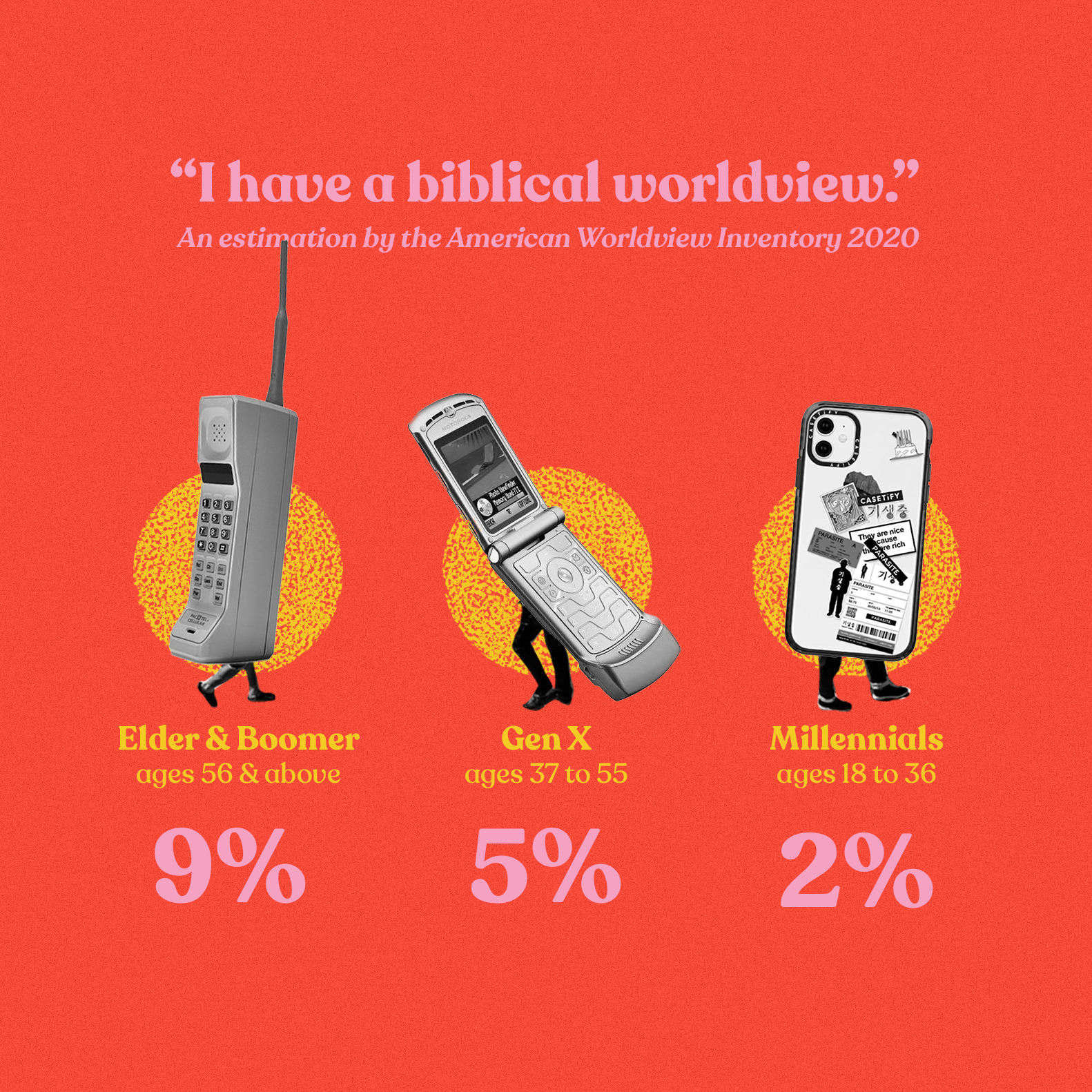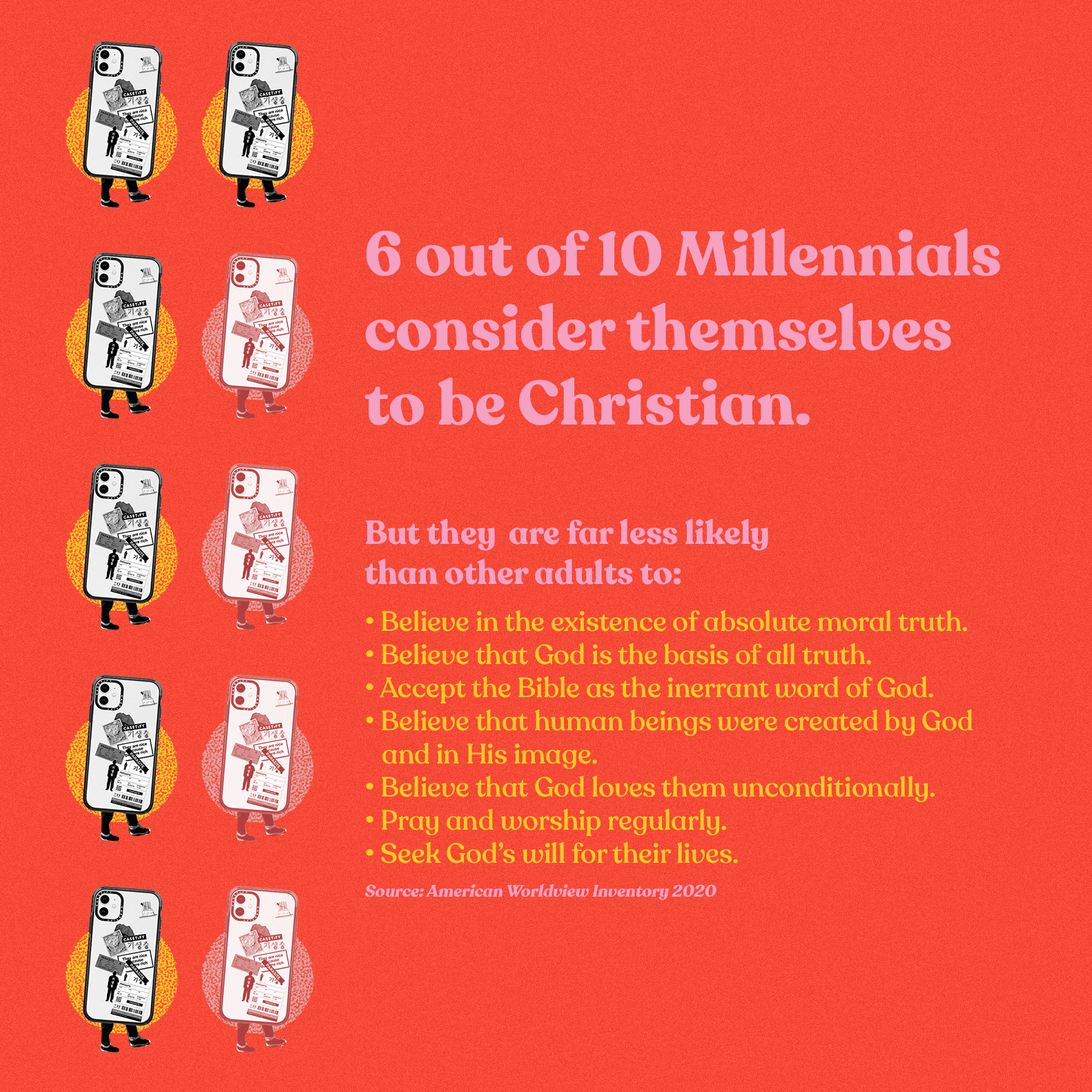Last week, there was a study released in the US that looked at the Millennial generation and their worldviews.
Here are a few points that stood out, according to an annual survey conducted in January 2020 with a nationally representative sample of 2,000 American adults.
- Millennials have radically different beliefs about respect, faith and politics compared to previous generations.
- Millennials are rejecting the Christian faith, with only 2% possessing a biblical worldview. In comparison, it’s 9% for the Elder and Boomer generations and 5% for Gen X.
- As a whole, the US is seeing a rapid erosion of the biblical worldview in culture – only 6% of adults today hold a biblical worldview, down from 12% two decades ago.
That’s the picture of a country being torn apart by generations, even as it already lies sundered along lines like race and politics.

These findings from the American Worldview Inventory 2020 are “troubling”, said Dr George Barna, Director of Research of the Cultural Research Center at Arizona Christian University.
(If his name sounds familiar, it’s because he’s also the founder of market research firm Barna Group. We’ve talked about some of Barna’s past surveys before; you may also have heard your pastor use their statistics in their sermons.)
The great differences between Millennials and their predecessors suggest “a nation that is at war with itself to adopt new values, lifestyles, and a new identity”, he remarked.
Or in other words, “a war for worldview dominance”.
Culture has caught up a lot faster than the Church has.
These insights matter, even to the local context, because it’s our chance to examine whether the same is happening in Singapore, or may happen in the future if we don’t address it. And by doing so, we can look at how to bridge gaps in faith and culture.
But before we get into it, let’s switch gears for a moment and talk about the importance of a worldview.
WHAT’S IN A WORLDVIEW?
More than just your understanding of how the world works, a worldview actually dictates how we live and interact with the world around us. It is a fundamental part of our everyday existence.
A biblical worldview, takes a step further. It is filtering our view of the world through the lens of Scripture. So when it comes to an issue like injustice, for example, a biblical worldview might inform us differently.
We would first have to understand what does the world says about this issue. Then, more importantly, we must know what the word of God says about this issue. A biblical worldview then informs us on what God wants us to say and do in response.
That’s what is at stake for the coming generations. So with that in mind, let’s take a look at some of the key findings.
THE LARGEST FAITH GAP IN 7 DECADES
Barna learnt that the faith gap between Millennials and their predecessors is the widest intergenerational difference in the last seven decades.
More strikingly, there were significant differences in the beliefs of Millennials (aged 18-36) and Boomers (aged 56-74) in nearly every category.
“Surprisingly, six out of 10 Millennials (61%) consider themselves to be Christian. Yet when asked about their personal beliefs and faith practices, they differ significantly in many areas from other generations,” observed Barna.
Where are the differences?
Looking at an excerpt from the long list of factors that show disengagement from Christianity, findings like these form the picture of what Barna termed as a “robust rejection of the Christian faith”.

As a Millennial, when I take a look at the friends around me who have left the faith or have become disillusioned by its trappings, I believe there is indeed truth in Barna’s findings.
As a woke generation, many Millennials align themselves with persuasive ideologies (e.g. liberalism) in part because a biblical worldview was never established from young. So this is how they make sense of the world – through what their friends say about the world on social media, for instance.
But I also wonder if the problem goes two ways in our spiritual communities. I’d be willing to wager that this disengagement is also symptomatic of a failure in discipleship and leadership. To an extent, one might say it is the older generations reaping what they’ve sown.
Culture has caught up a lot faster than the Church has.
Of course, that isn’t to say there isn’t anything to be done to slow or stop the “rot”. Instead, for those of us in positions to guide, shape and mould worldviews, we may need to begin uprooting certain things that are rotting.
We need new seeds from God, and we need to sow them.
FLIRTING WITH “CULTURAL DECLINE”
The data also suggests that the US is “losing its spiritual unity at a rapid pace”.
“The heart and soul of the nation pursue other gods and beliefs to our detriment as a nation,” warned Barna.
“And a nation with an influential — and, indeed, its largest — generation reflecting indifference toward the overall health and well-being of the nation is one flirting with cultural decline.”
This “cultural decline” Barna writes about has perhaps never been more evident than in recent years.
Nowadays, whenever I talk about what’s going on in the US with my friends, the words that tend to come up go along the lines of “jialat” and “quite bad ah”.
But I always think back to growing up in the ’90s, when the country seemed to be the Promised Land. America. I genuinely believed it was the greatest country in the world.
And in only 30 years, that great legacy has lost its lustre! To be sure, there are a plethora of reasons for why things have gotten so bad, but I personally put the main one down to losing that spiritual base.
Watching a nation have the carpet pulled out from under her feet, I’m taking it as a lesson from one rich nation of many Christians to another, right here in Singapore.
So, looking at these findings, we must appreciate that this spiritual disunity isn’t a uniquely American problem. We are just as susceptible to the “cultural decline” Barna warns of.
We just can’t afford to take things for granted.

As a member of the younger generation, my takeaways are fourfold.
- Develop a biblical worldview.
- Choose unity and honour.
- Pray for our leaders and elders.
- Be a generation that brings kingdom transformation.
I’m sure you can think of more; these ones are just my own. In a miry world where – increasingly – anything goes, we need to be a steel rod that stands straight in the shifting sand.
It’s profoundly countercultural, what we have to do to bridge the divides.
At 28 – somewhat caught in the middle – I want to say, when my time is up, that I was a pillar for the old and weary to lean on, and a guide and support for the young.
After all, if the younger ones are to see the relevance of Christianity, it will be in the radical living their elders and shepherds model for them.
So pray for America. Pray for Singapore.
And by God’s grace, may Barna’s dream for his nation come to pass both there and here – to see “citizens who will love God, family and country” rise up once again.
- Check out the list of questions asked in the American Worldview Inventory 2020. Which of these beliefs or behaviours do you struggle to identify with?
- How much of your worldview is shaped by the Bible vs what culture says?
- How are you being discipled? Are you discipling others?









